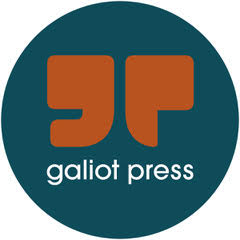On Creating Galiot Press
by Henriette Lazaridis
Co-Founder, Galiot Press
 A few years ago, I made what was already my customary joke about publishing to a writer friend of mine. “When I have my publishing company,” I said, “I’m going to fix all that.” But I wasn’t really joking, and I think my friend could tell. Because her reply to me wasn’t her usual chuckle, but “If you’re really serious about that, I’ll do it with you.” And thus, Galiot Press was born, co-founded by me and Anjali Mitter Duva.
A few years ago, I made what was already my customary joke about publishing to a writer friend of mine. “When I have my publishing company,” I said, “I’m going to fix all that.” But I wasn’t really joking, and I think my friend could tell. Because her reply to me wasn’t her usual chuckle, but “If you’re really serious about that, I’ll do it with you.” And thus, Galiot Press was born, co-founded by me and Anjali Mitter Duva.
We spent the next three years researching all aspects of the publishing industry, speaking to booksellers, agents, editors, cover designers, readers, and authors. We’re both authors, so it was a fascinating shift for both of us into new territory, studying the economics of publishing, researching the technological possibilities, digging into the history and trying to chart a viable path into the future. We learned a lot that we now share openly with other writers, to help them understand the industry they’re intrinsic to. We spent hours and hours (too many hours!) coming up with a name for our new press—something that could evoke the right meaning while also lending itself to an artistically inviting and sophisticated logo.
After some first-draft names, we arrived at Galiot Press. We were thinking about ships, about how they carry people together to a new destination, about how they navigate currents and crosscurrents. And the galiot, it turns out, is a vessel that uses both oars and sails to make it nimble and adaptable as it travels. This felt right. Add to that that I’m a rower and that “galiot” sounds like the French that Anjali grew up speaking, and we had our name. It wasn’t much later that our amazing designer showed us the logo we love, that turns the company’s initials into something that also looks like quotation marks.
More important than the logo, of course, was what that logo would represent. Our mission behind founding the press came back to those moments when I used to make my little joke about “when I have my publishing company”. This was what I used to say at every new discovery of a fantastic manuscript that a friend was unable to place with an agent or editor. I want to stress that I don’t think this is the fault of those agents or those editors. They work incredibly hard as champions of their authors. It’s not anybody’s fault that certain books—ones by new voices, ones that defy categorization, ones by authors of underrepresented backgrounds—struggle to get published. It’s a reality of the current system in which most traditional publishing companies operate as venture capital firms, and every book they buy is a venture project.
The Big Five are big enough that they can take on enough venture projects to become VC mutual funds, in a way. They can buy a quiet novel that’s artsy and complicated and that they assume won’t sell much because that venture will be offset by the financial success they’ll have with the splashy, high-concept novel from a familiar name. The VC system is great—if you’re one of the less mainstream books that make their way onto bookstore catalogues and shelves. As Courtney Maum has pointed out recently, there are some amazingly unusual and one-of-a-kind novels being published by none other than the Big Five.
Still, for every one of those unique, culturally-relevant, and discussion-worthy books that makes it through, there are dozens more that struggle to reach readers. Anjali and I believe that a lot of these difficulties come down to one essential element of publishing: the print run.
Print runs require the publisher to front a significant amount of cash months before the books is even for sale. They demand that a publisher come up with an estimate of future sales so they’re not left holding the bag—i.e. stuck with the stacks of books that get returned from bookstores and possibly even have to be pulped, all at publisher’s expense. With a print run, you have to think really hard about taking on any project whose success you can’t reasonably guarantee (see above: splashy novel by familiar name). You can take on one or two of the unusual books because your losses there will be covered by the splashy success. But no matter how you cut it, to print the books ahead of time, you have to make a guess at how they’ll sell. So you’re more likely to play it safe, and take on books that are similar to what you’ve successful sold before.
At Galiot Press, we want to take artistic risks, not financial ones, so we’re not doing print runs. We’re using print-on-demand technology to produce a copy of one of our books only when there’s a customer who’s already paying for it. We will never be in the position of having spent money we’re not sure we can recoup. This means that, rather than having to rely on the novels whose sales track we feel we could predict, we can give a chance to books we love that fall between genres or that mix categories or otherwise do something bold or new.
This was nowhere clearer than when I went to Publishers Marketplace to post our first book deal, Emily Ross’ SWALLOWTAIL, and reached the place where I had to check the box for the book’s genre. Is it crime? Yes. But it’s also literary, and mystery, and possesses many other ineffable qualities that make the story almost mythological, sociological, an exploration of women’s representations in our culture. How do you capture that with the single word “crime”? At Galiot Press, we don’t even want to have to.
We’re in the thick of it now, several months before Emily’s book and Robyn Ryle’s SEX OF THE MIDWEST come out. Our days are spent on a combination of reading manuscripts, reading queries, fine-tuning the spreadsheets, updating our slide deck for pitches to investors, editing accepted manuscripts, managing the processes of production, including author questionnaires, promo ideas, planning our classes and workshops, and on and on.
There’s much more to say about Galiot Press—like how we accept queries from unagented or agented authors through a process that guarantees a response within a week, like how we’re building a distribution system that augments our presence in the Ingram catalogue with partners with other venues and bridges the gap between the analog and the digital, like how our business model projects that we can make a profit while selling books and fairly compensating authors. If you’re interested, visit our site and see what we’re up to!
—
 Henriette Lazaridis is the author of Last Days in Plaka (a Good Morning America Buzz Pick), Terra Nova (which the New York Times called “ingenious”), and The Clover House (a Boston Globe bestseller). A first-generation Greek/American, she earned degrees in English literature from Middlebury College, Oxford University, where she was a Rhodes Scholar, and the University of Pennsylvania. Having taught English at Harvard, and at GrubStreet in Boston, she runs the Krouna Writing Workshop in northern Greece. Her essays and articles have been published in Elle, Forge, Narrative Magazine, The New York Times, New England Review, and elsewhere. An avid athlete, Henriette writes about athletic and creative challenges at The Entropy Hotel on Substack.
Henriette Lazaridis is the author of Last Days in Plaka (a Good Morning America Buzz Pick), Terra Nova (which the New York Times called “ingenious”), and The Clover House (a Boston Globe bestseller). A first-generation Greek/American, she earned degrees in English literature from Middlebury College, Oxford University, where she was a Rhodes Scholar, and the University of Pennsylvania. Having taught English at Harvard, and at GrubStreet in Boston, she runs the Krouna Writing Workshop in northern Greece. Her essays and articles have been published in Elle, Forge, Narrative Magazine, The New York Times, New England Review, and elsewhere. An avid athlete, Henriette writes about athletic and creative challenges at The Entropy Hotel on Substack.
 Anjali Mitter Duva, half Indian and half American, was raised in France. She is the author of the historical novel Faint Promise of Rain which was shortlisted for a William Saroyan International Prize for Writing, and she has been a Finalist for a Massachusetts Cultural Council Artist Fellowship. Anjali has been an instructor at Grub Street Writers and is a former fiction Co-Editor at Solstice Literary Magazine. She co-founded and runs the Arlington Author Salon, a quarterly literary series with a twist, and is also a co-founder and former executive director of Chhandika, a non-profit organization that teaches and presents India’s classical storytelling kathak dance. She writes about the mixed experience and the richness to be found in the overlaps and in-betweens at Mixed Marginalia on Substack. Anjali was educated at Brown University and MIT.
Anjali Mitter Duva, half Indian and half American, was raised in France. She is the author of the historical novel Faint Promise of Rain which was shortlisted for a William Saroyan International Prize for Writing, and she has been a Finalist for a Massachusetts Cultural Council Artist Fellowship. Anjali has been an instructor at Grub Street Writers and is a former fiction Co-Editor at Solstice Literary Magazine. She co-founded and runs the Arlington Author Salon, a quarterly literary series with a twist, and is also a co-founder and former executive director of Chhandika, a non-profit organization that teaches and presents India’s classical storytelling kathak dance. She writes about the mixed experience and the richness to be found in the overlaps and in-betweens at Mixed Marginalia on Substack. Anjali was educated at Brown University and MIT.
Category: On Writing




























